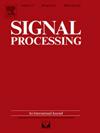Double-optimized symmetric geometric mode decomposition with dispersion entropy and its application in feature extraction
IF 3.4
2区 工程技术
Q2 ENGINEERING, ELECTRICAL & ELECTRONIC
引用次数: 0
Abstract
Symmetric geometric mode decomposition (SGMD) offers notable advantages in preserving the basic features of time series and in noise robustness. However, SGMD faces issues related to inaccurate mode decomposition and parameter selection. To address these problems, this paper proposes a double-optimized symmetric geometric mode decomposition with dispersion entropy (DSGMDDE). This algorithm incorporates dispersion entropy(DisE) as an indicator for mode reconstruction, enhancing the accuracy of mode decomposition. Furthermore, a double optimization algorithm is introduced to optimize parameters, thereby improving the effectiveness of the algorithm. By combining DSGMDDE with DisE, a feature extraction method named DSGMDDE-DisE is proposed. Simulation results demonstrate that, compared to four other mode decomposition algorithms, DSGMDDE offers higher decomposition accuracy and better robustness. Furthermore, DSGMDDE-DisE shows superior feature extraction capability compared to the other four feature extraction methods. Real-world experiment results indicate that DSGMDDE-DisE can more accurately distinguish between eight types of ship radiated noises (SRNs) and five types of Southeast University bearings (SUBs) fault signals.
色散熵双优化对称几何模态分解及其在特征提取中的应用
对称几何模式分解(SGMD)在保留时间序列的基本特征和噪声鲁棒性方面具有显著优势。然而,SGMD 面临着模式分解和参数选择不准确的问题。为了解决这些问题,本文提出了一种具有频散熵的双重优化对称几何模态分解算法(DSGMDDE)。该算法将色散熵(DisE)作为模式重构的指标,提高了模式分解的准确性。此外,该算法还引入了双重优化算法来优化参数,从而提高了算法的有效性。通过将 DSGMDDE 与 DisE 相结合,提出了一种名为 DSGMDDE-DisE 的特征提取方法。仿真结果表明,与其他四种模式分解算法相比,DSGMDDE 具有更高的分解精度和更好的鲁棒性。此外,与其他四种特征提取方法相比,DSGMDDE-DisE 显示出更出色的特征提取能力。实际实验结果表明,DSGMDDE-DisE 能更准确地区分八种船舶辐射噪声(SRN)和五种东南大学轴承(SUB)故障信号。
本文章由计算机程序翻译,如有差异,请以英文原文为准。
求助全文
约1分钟内获得全文
求助全文
来源期刊

Signal Processing
工程技术-工程:电子与电气
CiteScore
9.20
自引率
9.10%
发文量
309
审稿时长
41 days
期刊介绍:
Signal Processing incorporates all aspects of the theory and practice of signal processing. It features original research work, tutorial and review articles, and accounts of practical developments. It is intended for a rapid dissemination of knowledge and experience to engineers and scientists working in the research, development or practical application of signal processing.
Subject areas covered by the journal include: Signal Theory; Stochastic Processes; Detection and Estimation; Spectral Analysis; Filtering; Signal Processing Systems; Software Developments; Image Processing; Pattern Recognition; Optical Signal Processing; Digital Signal Processing; Multi-dimensional Signal Processing; Communication Signal Processing; Biomedical Signal Processing; Geophysical and Astrophysical Signal Processing; Earth Resources Signal Processing; Acoustic and Vibration Signal Processing; Data Processing; Remote Sensing; Signal Processing Technology; Radar Signal Processing; Sonar Signal Processing; Industrial Applications; New Applications.
 求助内容:
求助内容: 应助结果提醒方式:
应助结果提醒方式:


